 Petzlover
Petzlover Javanese is originated from United States but Siberian is originated from Russia. Both Javanese and Siberian are having almost same weight. Javanese may live 3 years less than Siberian. Both Javanese and Siberian has same litter size. Javanese requires Low Maintenance. But Siberian requires Moderate Maintenance
Javanese is originated from United States but Siberian is originated from Russia. Both Javanese and Siberian are having almost same weight. Javanese may live 3 years less than Siberian. Both Javanese and Siberian has same litter size. Javanese requires Low Maintenance. But Siberian requires Moderate Maintenance
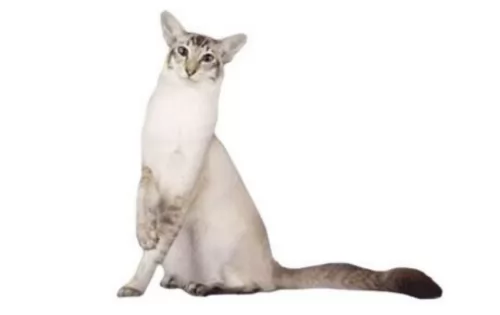 The Javanese is also known as the Colourpoint Longhair in some cat registries, but it's a purebred domestic cat that was developed in North America.
The Javanese is also known as the Colourpoint Longhair in some cat registries, but it's a purebred domestic cat that was developed in North America.
It was Helen Smith that coined the name Javanese cat in 1950 with the name being derived from the tradition where cats of the Orient have the names of the countries and islands of south-east Asia.
The name Javanese was chosen by choosing Java, an island near Bali.
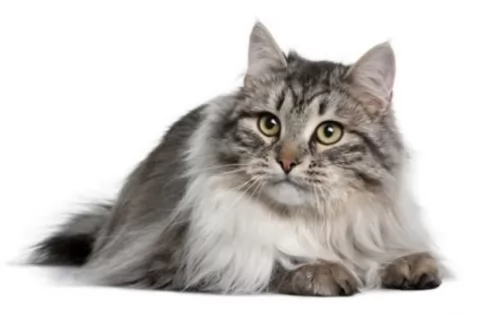 The beautiful Siberian cat originated from Russia, a very cold area which explains his thick coat.
The beautiful Siberian cat originated from Russia, a very cold area which explains his thick coat.
This is a natural variety of domestic cat. It is an ancient breed and it is believed that it is ancestral to all modern long-haired cats.
The Siberian is the national cat of Russia. The cat first arrived in the United States in 1990.
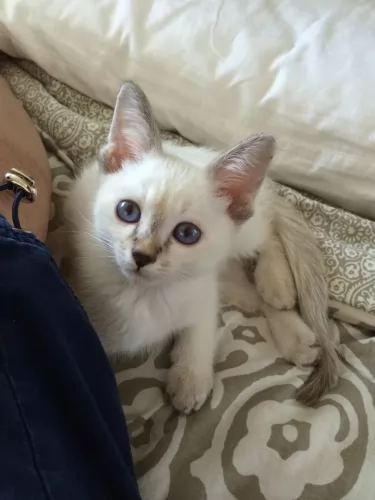 The Javanese is a medium-sized, slender, muscular cat that weighs between 3 and 6kg. It has a short or long, silky coat that comes in a number of colors. The short-haired variety has a single coat, in contrast to the double coat found in the long-haired breeds.
The Javanese is a medium-sized, slender, muscular cat that weighs between 3 and 6kg. It has a short or long, silky coat that comes in a number of colors. The short-haired variety has a single coat, in contrast to the double coat found in the long-haired breeds.
The tail is fairly plumed. The Javanese also has point coloration which means that the body is paler than the darker face. The coat comes in a variety of colors and patterns, from dark brown to cream to tortoisehell and others. The ears are large and the almond-shaped eyes are always blue.
Siamese and the Javanese differ a little in coat length and color but otherwise they are much the same in temperament. They love their human families and will follow them around like a dog.
When you sit down they like to curl up in your lap and simply be around you. They may not be as vocal as the Siamese but he is still prepared to have a jolly good conversation with you.
They’re clever cats too and like stimulating games and toys. He loves to climb, so a climbing tree will be excellent for him. He also likes being busy, so if you leave him alone for a length of time, ensure that he has activities to keep him happily amused.
If you have a Javanese be sure to include him in your activities just like you would a child of yours.
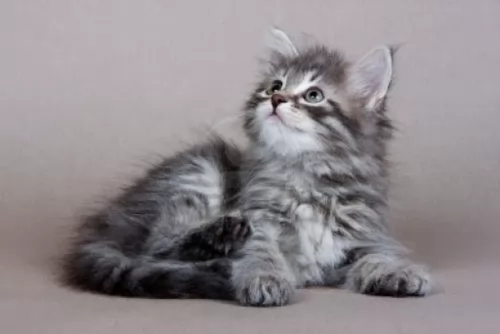 The Siberian is a medium to large-sized cat that weighs between 3 and 7kg. They are known to be excellent jumpers.
The Siberian is a medium to large-sized cat that weighs between 3 and 7kg. They are known to be excellent jumpers.
It is a powerfully built cat with large paws and a full tail. The ears are medium in size with large round eyes. The cat has a slight arch to its back as the hind legs are a bit longer than the front legs.
The glossy coat is in three layers to protect it from extreme weather conditions. It comes in different colors such as tortoiseshell, colorpoint, tabby, and solid. He sheds a couple of times a year.
The Siberian cat is highly affectionate with family and playful too. In spite of that, he also loves curling up close to where his humans are.
This friendly cat will want to follow you and be where you are. They’re intelligent and can be taught a few tricks. Because they’re athletic, it will be a good idea to buy him a climbing tree as he loves to leap up to a perch and watch things going on. He gets on well with children and other pets.
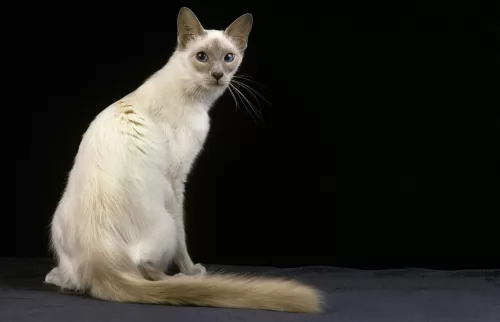 Your medium-sized Javanese cat is active and talkative. These are cats that love leaping up onto high perches and into trees and it is therefore imperative that you invest in climbing equipment for him.
Your medium-sized Javanese cat is active and talkative. These are cats that love leaping up onto high perches and into trees and it is therefore imperative that you invest in climbing equipment for him.
These slender Oriental cats need an excellent diet to maintain the fine-boned, muscular physique. You don’t want your Javanese becoming overweight as this spells bad health and sluggishness.
The Javanese is such a lively cat if his weight is maintained and he loves being around his human family, purring away while he is lovingly made a fuss of.
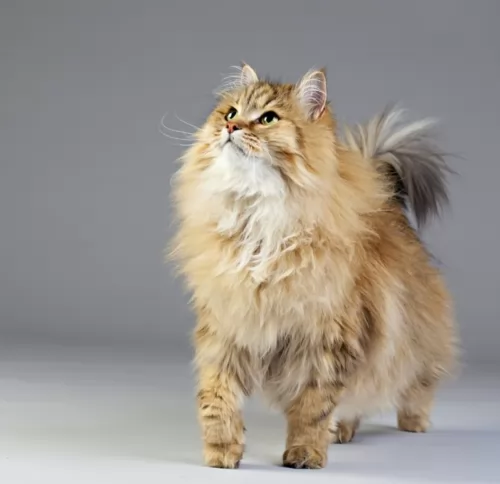 Your Siberian loves to climb and explore and to keep this gorgeous cat mentally stimulated and physically active, provide him with some fun toys that require him to think.
Your Siberian loves to climb and explore and to keep this gorgeous cat mentally stimulated and physically active, provide him with some fun toys that require him to think.
They are nice and strong these cats as well as being curious and alert and you see this in the bright, shiny eyes.
They’ve got easygoing personalities and are also considered fairly low maintenance cats, making them the perfect choice for any cat lover.
They are devoted and loyal to their human family and one of these cats in your home is guaranteed to bring in joy, entertainment, fun, and solid companionship.
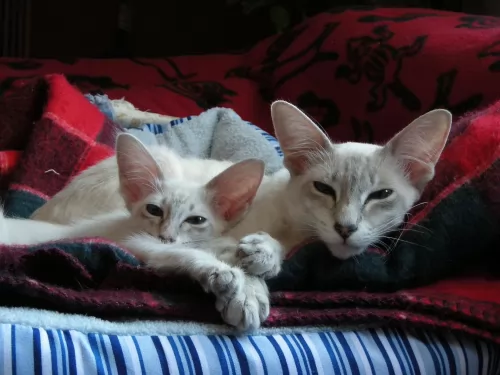 The same health issues that you’re likely to pick up with the Siamese may well be found in the Javanese too.
The same health issues that you’re likely to pick up with the Siamese may well be found in the Javanese too.
Some of the health issues to look out for include among others, asthma or bronchial disease, heart defects, lymphoma as well as gastrointestinal conditions.
For the health of your Javanese cat, make sure the vaccinations are up to date.
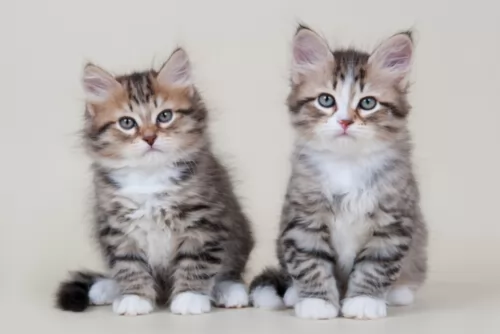 Siberian cats can succumb to stomach issues such as IBS. If you think your Siberian is in pain, he will need a visit to the vet. These cats are also susceptible to some hereditary health issues such as hypertrophic cardiomyopathy. If you buy a kitten, make sure you get your kitten from a reputable source.
Siberian cats can succumb to stomach issues such as IBS. If you think your Siberian is in pain, he will need a visit to the vet. These cats are also susceptible to some hereditary health issues such as hypertrophic cardiomyopathy. If you buy a kitten, make sure you get your kitten from a reputable source.
To ensure the best health for your Siberian, he will need high-quality cat food. High-quality food can actually prevent many health issues in the cat. A good idea will be to feed your Siberian vet-recommended food and in the right portions to keep him at the ideal weight.
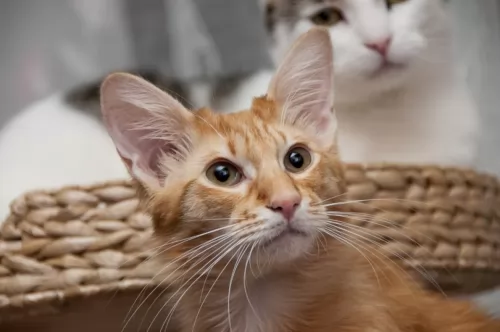 Cats are carnivores and have special dietary needs. They have unique nutritional needs, something like lions and cheetahs.
Cats are carnivores and have special dietary needs. They have unique nutritional needs, something like lions and cheetahs.
Their protein needs are very high, especially when they are kittens or nursing mothers. They need animal protein in their diets. Some of the unique nutritional needs of cats require them to have this protein as well as very important amino acids such as arginine and taurine.
Just because your cat needs such a high intake of protein, it doesn’t mean he won’t need other nutrients. Cats need balanced nutrition that is right for them. The best commercially manufactured cat food with fats, carbs, minerals, and vitamins will ensure a healthy cat. Speak to your vet if you’re not sure.
Not all cat foods are the same and choosing the right cat food will ensure your cat gets a sufficient dose of protein powder. So important is a cat’s diet for good health, that it will be important to speak to your vet about the food requirements of cats.
With grooming, the fine silky coat can be cared for easily by giving it a brush each week. You want to remove loose hairs from shedding. You can also take a damp cloth and wipe your Javanese down.
The nails will also need to be trimmed. When you brush your cat, check up on other things too.
Make sure the eyes are nice and clear, the fur soft and vibrant, make sure there are no new and unusual lumps.
Check inside his mouth for bad teeth that could be causing all kinds of health issues and check inside his ears too. For all these grooming issues, a pet grooming parlor can do it all for you.
Provide your Javanese with a litter box and keep the box scrupulously clean.
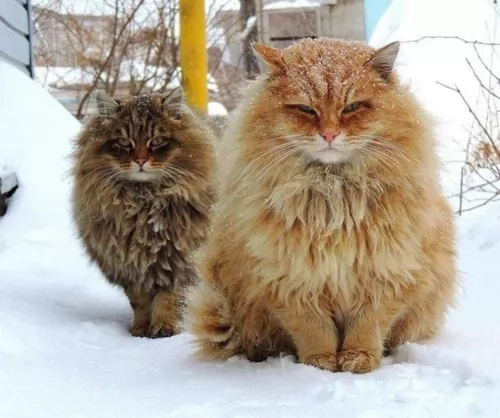 Prepare your home for the arrival of your Siberian cat. Cats are natural climbers and scratchers and he will need a scratching post, climbing tree, litter box, food and water bowls, bed as well as collar and tag. Also, invest in a large cat carrier, as your cat will need to be transported safely to the vet at certain times.
Prepare your home for the arrival of your Siberian cat. Cats are natural climbers and scratchers and he will need a scratching post, climbing tree, litter box, food and water bowls, bed as well as collar and tag. Also, invest in a large cat carrier, as your cat will need to be transported safely to the vet at certain times.
Provide toys for your Siberian cat. They’re intelligent and you don’t want to have him bored and listless. They need mental and physical stimulation so it will be fun to invest in some puzzle games for your pet.
Siberians have lovely thick coats and you want the right grooming accessories to brush him so that the coat doesn’t get dull and tangled. He will need to be brushed once or twice a week, especially when he sheds.
Keep your Siberian healthy by seeing he gets to the vet when he is sick. Also, if he is a kitten, he will need his vaccines. He will need to be checked over for parasites too – ticks, fleas, and worms, more so if he is an outdoor cat.
Trim your Siberian's nails as needed and also check the inside of his ears for signs of redness, dirt, and wax buildup as well as unpleasant odors. Many cat owners don’t like to probe around inside a cat’s ears as it can be damaging if you don’t know what you’re doing. Rather ask your vet to do it for you.
The vet can also check your cat’s teeth for signs of infection. Many people recommend cleaning the cat's teeth with a brush and cat toothpaste but this can be most traumatic for a cat and your pet groomer or vet can rather check his teeth for you.